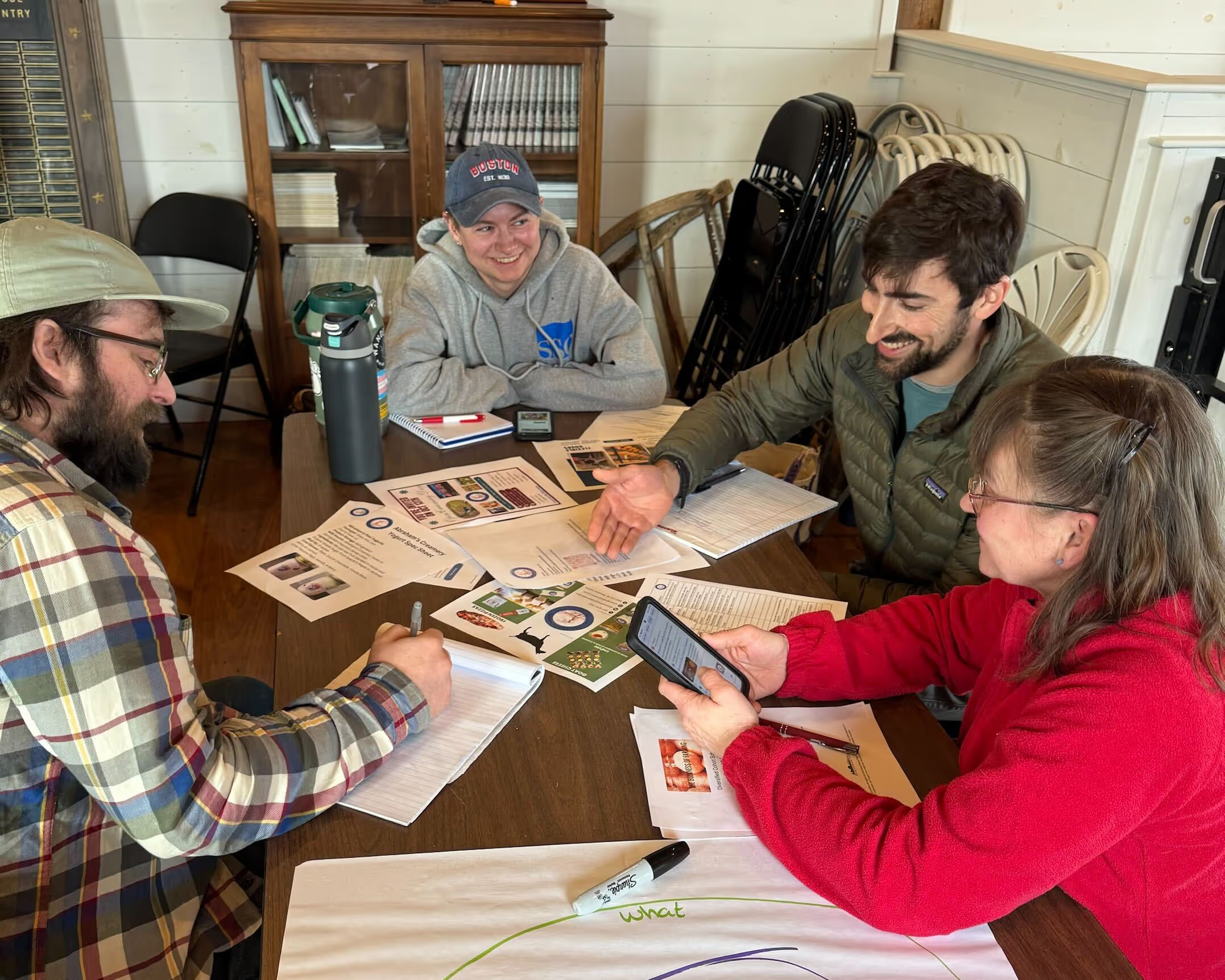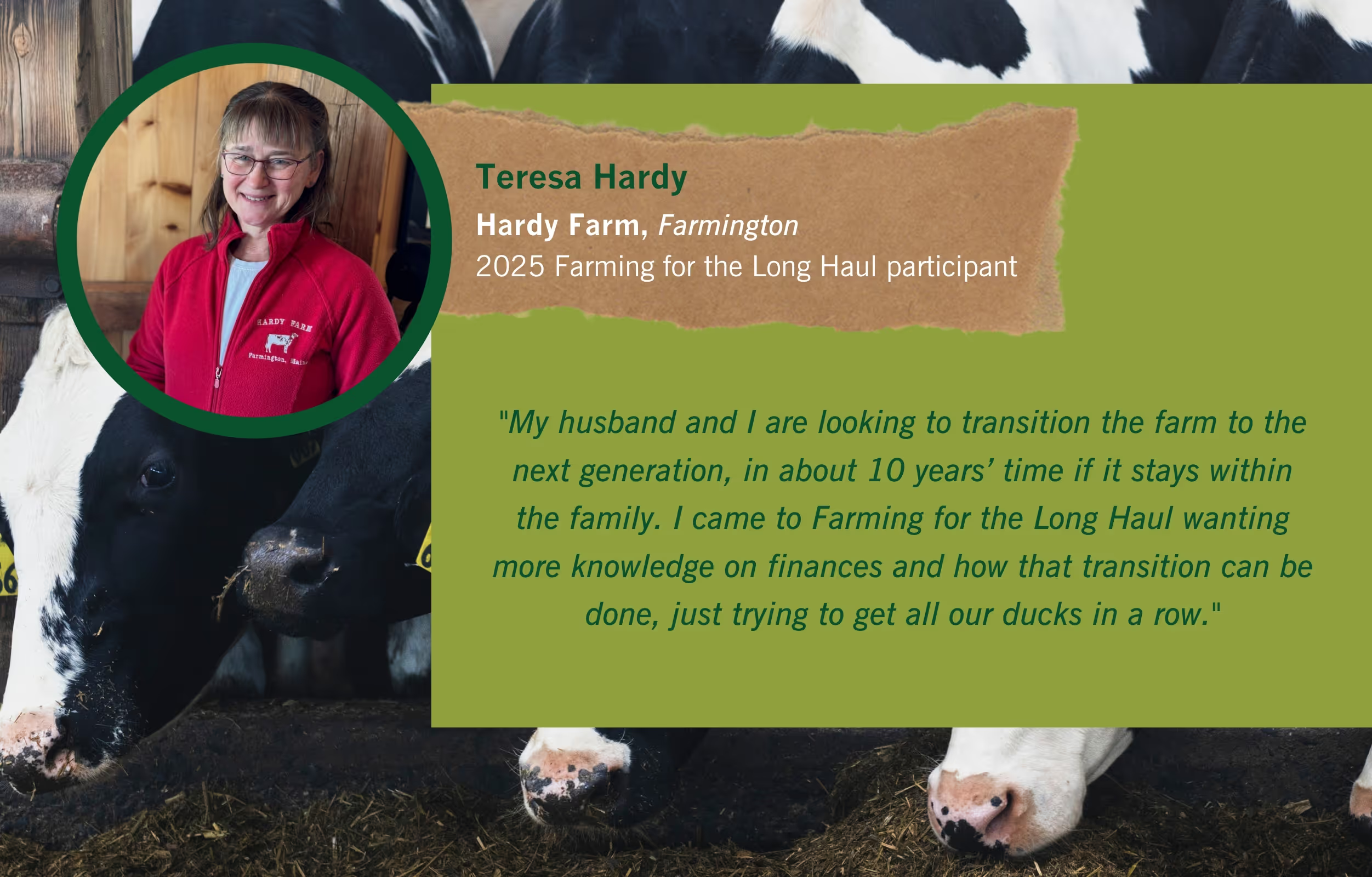
May 7, 2025
|
Kristina Buckley
Farmers enter into our farm business planning programs from all different backgrounds and at different points in their farming careers, bringing with them varied experiences in the size and scale of their operations, what they produce, organic, conventional, till and no-till, first generation, and multi-generational family farms. While it might seem like they have little in common, we have heard from farmers in the program time and time again that the opportunity to build relationships with and problem solve challenges on their own farms from different vantage points is one of the most valuable things they take away from the programs.
The work of running a farm business requires farmers to be scientists, growers, animal caretakers, mechanics… and marketers, accountants, and employers, too. This often unseen work can be taxing and trying – yet it’s vital to a farm’s success.
Meet four of the 20 farms participating in the 2025 Farming for the Long Haul and Business of Farming programs and hear more about what brought them to this work.
.avif)
Fair Share Farm, Wayne
Todd Chretien started Fair Share Farm in 2022 after a long career in teaching, where he saw firsthand the value of the local farm to school network. He decided to get involved from the farming side, and started Fair Share Farm out of a desire to build a sustainable business that supported his family and aligned with his community-oriented values.
Growing diversified organic vegetables on under 2 acres, Todd has learned there’s a lot he can grow on a little piece of land. Fair Share Farm produces a diversity of vegetables, from tomatoes, spinach, and snap peas to green peppers, beets, and potatoes, selling produce at local farmers markets and to CSA customers. For their CSA, the farm offers a sliding scale tiered pricing system that allows for greater accessibility to local food while still supporting the viability of the business, both of which are very important to their business model.
Todd joined the Business of Farming cohort with the goal of “utilizing the seed grant to revamp our website, making it more user friendly. And secondly to get a better grip on the costs of the farm and figuring out how to make money.” Todd also talked about how the opportunity to talk through hurdles and problem-solve with other farmers is a major time and energy saver. He urged fellow farmers to “really ask for advice! Don't be afraid to ask silly questions. And almost every farmer does everything a little bit differently, so you're going to get different answers from different farmers. But overwhelmingly, farmers are generous with their time. They want to see other farmers succeed. I've yet to come across a farmer who will generously share that with anyone, it's a really wonderful community.”

Hardy Farm, Farmington
For decades, Teresa Hardy and her husband Henry have carried on a family tradition of farming, raising Ayrshires and Holsteins on their 400-acre organic dairy. In addition to milk, they also produce a lot of hay, maple syrup (for hobby), raise some broilers and turkeys, and Teresa crafts homemade milk soap. You can find their products in the warmer seasons at their farmstand.
In spite of the hard work of calving year-round, twice-daily milking, and the many continuous chores that dairy farming demands, Teresa shared a few of the things that keep her going, like being her own boss and “the love for the animals and working outside. My job changes every season. In the summer it’s hay hay hay, in the spring I'm getting the gardens ready and the new crops are coming up, and different things in fall and winter. And raising my own kids - they went to work with me; granted, it was across the front lawn, but they grew up being hard, resilient workers.”
At this point in their farming careers, the Hardys are thinking about the future of the farm, whether that ends up being within their family, or whomever goes on to farm the property in the future. Teresa is thinking through some of these questions in the Farming for the Long Haul program as she dives deeper into some of the financial planning for that transition.
.avif)
Dancing Harvest Farm, South Portland
Daniela Aldrich started Dancing Harvest Farm on 4 acres of leased land in South Portland in 2021, after seeing the property listed on Maine FarmLink, MFT’s farm linking service. Starting a new chapter after her time as a professional ballerina, Daniela was looking for a new career that involved movement and using her body in an expressive way, and she found that in the physicality and daily routines of farming.
Daniela now grows vegetables, herbs, and flowers and operates a CSA. She’s smack dab in the middle of a residential area which she said makes it feel like she’s really connected to the town, and the CSA program is what you might call hyper-local, with most of their customers being in a walking distance (or very short drive) from the farm.
Connecting with her farming peers through this year’s Business of Farming program, Daniela has been inspired by hearing about each farm’s focus and the way farmers have tailored their individual business to their vision. Each farm “fills different holes” and she sees that as another expression of creativity. One of her reasons for joining the program “was to connect to different local producers and the wider food shed, because I’m in South Portland, but also in all of Maine. The peer-to-peer connections and learning is a big part of that, and making those connections on both a professional and a personal level can result in lots of other things.”
.avif)
Abraham's Goat Farm & Creamery, Newport
Kaili Wardwell has been operating a goat farm and creamery on 60 acres in Newport since 2016. From their goat milk they produce a whole host of artisanal dairy products including feta, chevre, kefir, and also offer goat meat, poultry, eggs, which can be found through number of retailers across the state including the Portland and Blue Hill Co-Ops.
With family roots in the food industry, Kaili got into farming from a desire to know where her meat comes from, “and we got into goats because it’s a really great lean meat and it’s delicious. We're a farmstead creamery, meaning that we raise the animals that produce the milk. We have 4-5 acres of pasture and have expanded into 6 acres of woods, so the goats can browse saplings in their natural environment.” Milking happens daily, and it takes about 3 days to culture the milk, remove and drain the curds, and then hand-roll with flavors like garlic and herbes de Provence and pack in specialty olive oil.
In joining this year’s Business of Farming program, Kaili was looking to pull back the curtain on the unit costs of production for their different cheeses. She was also eager to talk to other farmers about certain changes they were considering making, “finding out what other farmers have done and how it affected the bottom line of their business or farm.” Kaili’s chevre was also used in a case study during the program where she was able to get feedback on her products and how they’re marketed to find new ways to connect with her consumer audience.
Get involved!
Running a farm business, like any other small business, is no small feat. Across the state farmers are problem-solving every day to run successful operations and navigate challenges. If you’re a farmer looking for tools to help you continue to grow your farm business learn more here and consider applying for the 2026 farm business planning programs (applications open in the fall). Not a farmer, but a community member who wants to help? Join MFT with a gift this spring to power programs like these, and you can support the farms featured by purchasing their locally available products!
Sign up for our monthly email newsletter.